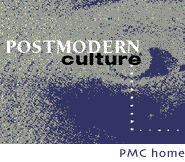
Abstracts
Volume 17, Number 2January, 2007
- Abstract: This essay identifies the voice, and its ability to reach and pull together even as it divides, as the pivot upon which a radical reconsideration of communication and the inevitability of miscommunication can turn. The concept of "intervocalic communion" is developed to explore these issues in three scenes: a choir in which each member sings a part unrelated to any of the others, a chattering crowd at the opening of an art exhibition, and the imagined multilingual din a few moments before the opening of a General Assembly meeting of the United Nations. Is communication possible in these scenarios that are essentially hostile to it? The essay argues that the (re-)introduction of silence into intervocalic communion--a special case of losing one's voice--reinvigorates the possibility of communication. --mb
- Abstract: This article reads Adorno's 1962 essay "Skoteinos, or How to Read Hegel" as an implicit program for Adorno's own writing practice. Throughout his oeuvre, Adorno is consistent in the demand that philosophical writing must enact in its "form" the arguments and negations that philosophy usually thought of as its "content." Commentators rightly take "The Essay as Form" as Adorno's most insistent manifesto on behalf of this very modernist idealization of writing. (Among this article's aims is to evoke the specifically modernist context of Adorno's thinking about writing, from Hegel to Mallarmé and beyond.) But "The Essay as Form" prescribes for philosophy, so to speak, generically, expounding the creative and expressive tension of "form" with "content" in general, without investment in any particular philosophical positions. "Skoteinos," by contrast, though not so explicitly staged as a program for philosophical writing, is vastly more fraught than "The Essay as Form" in mobilizing Adorno's prescriptions about writing as a critique of his most potent philosophical precursor. "Skoteinos" intimates Adorno's own ambitions, and anxieties, as a practitioner of (philosophical) theory and/or theorist of philosophical (writing) practice. "Skoteinos" stages Hegel's philosophical failures as a function of Hegel's failures as writer, and more broadly of Hegel's failure to bring the implications of his dialectic for language to realization in the "form" or textuality of his own writing--as if Hegel the "immanentist" should have known better than anyone that there could be no "end of art." Moreover, Adorno's account of Hegel's failure implicitly declares Adorno's own philosophical aspiration, renewing Hegel's project by correcting Hegel's shortcomings. If Adorno's grandiose claims for the aesthetic are usually assessed according to philosophical criteria, this article attempts the reverse, to do unto Adorno as "Skoteinos" does unto Hegel: to put Adorno's theory to the proof of his writing practice. --sh
- Abstract: The article analyzes the Lynn Hershman Leeson's film Teknolust (2002) as an alternative take on the visual creation of biodigitality. Arguing that Teknolust can be read as a probe into the infiltration of biodigital creatures in contemporary networks of communication, the article suggests that in the film the figures of sexuality, agency and technology are understood as non-human affects. Here, the idea of "insectoid" modes of agency underlines the tension between the three Self-Reproducing Automata (SRA) of the film: between human DNA and technological networks, and between heterosexual mating rites and viral biodigital forms of reproduction. --jp
- Abstract: The essay explores Kathy Acker's reconfiguration of heterosexual practice and identity in her "novel" Don Quixote. The essay shows how the production of dissident heterosexualities forms a radical critique of sexuality by situating Don Quixote in the controversy over what Michel Foucault has called "bodies and pleasures," the counterdiscursive concept he distinguishes from the reigning system of sex-desire. Through its claim to represent and legitimize excessive, perverse female heterosexual desires, Don Quixote reimagines socio-sexual relations through "bodies and pleasures" without giving up the critical force that the notion of sex-desire has offered feminist critics of the construction of the subject. Acker queers the conditions of representation by deploying the oppositional potential of "bodies and pleasures." --as
- Abstract: Christian Bök is the author of two collections of poetry: Crystallography (Coach House, 1994) and Eunoia (Coach House, 2001), which earned the Griffin Prize for Poetry in 2002. He is also a sound poet and conceptual artist; Bök has performed to audiences internationally, and his art has been showcased at the Marianne Boesky Gallery in New York and with the traveling text art exhibition Metalogos. This interview considers the wider scope of his artistic practice and his current project, The Xenotext Experiment, which explores the relationship between poetry and biotechnology. Bök hopes to encode a poetic text into the genetic sequence of a living organism. --sv
Marc Botha, How To Lose Your Voice Well
Steven Helmling, How To Read Adorno on How To Read Hegel
Jussi Parikka, Insects, Sex, and Biodigitality in Lynn Hershman Leeson's Teknolust
Annette Schlichter, "I Can't Get Sexual Genders Straight": Kathy Acker's Writing of Bodies and Pleasures
Stephen Voyce, The Xenotext Experiment: An Interview with Christian Bök
Copyright © 2007-1990
